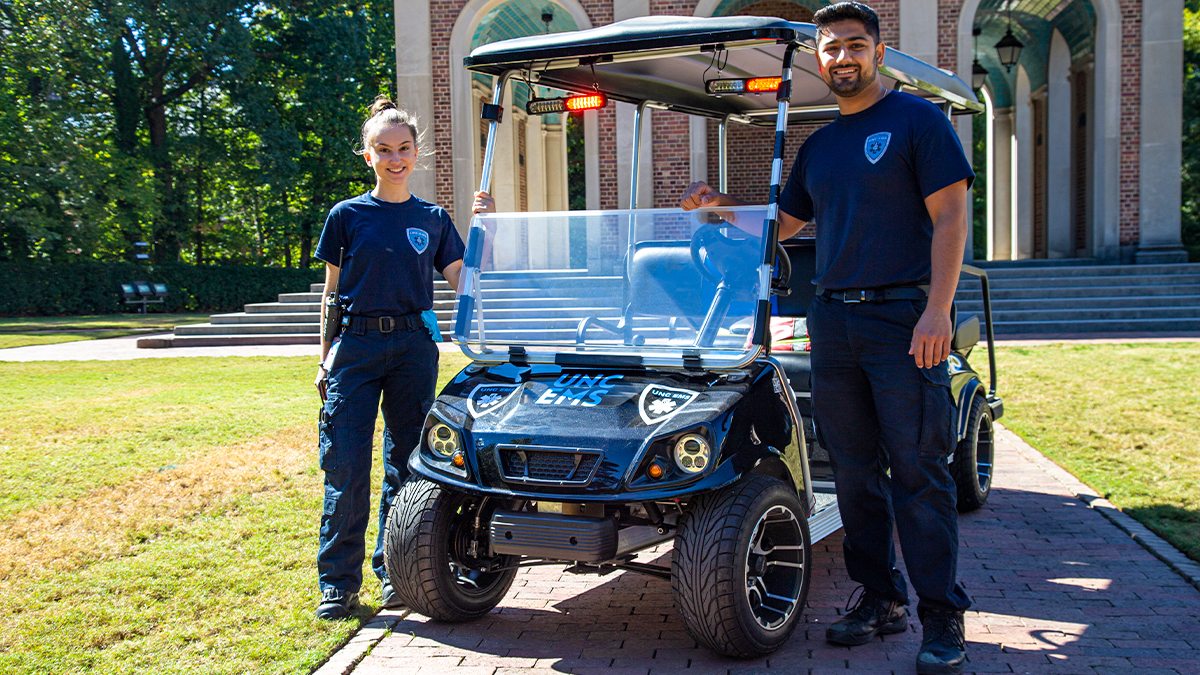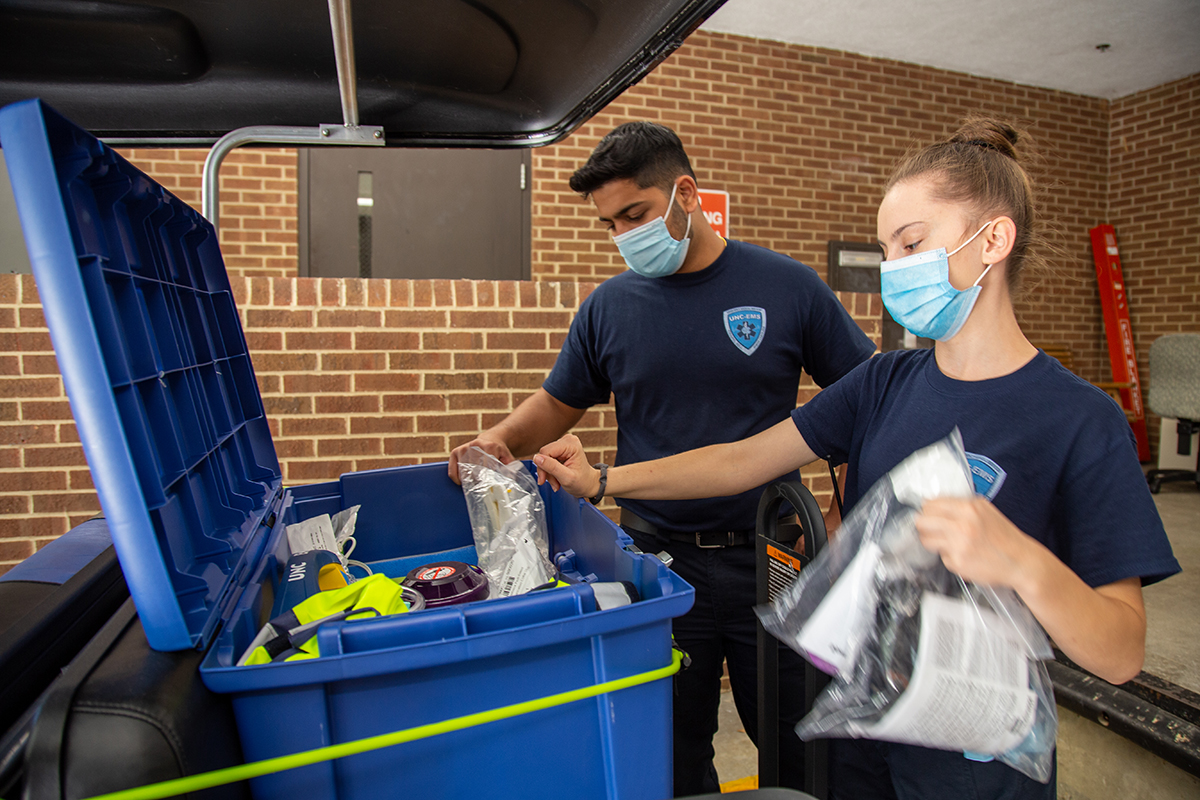An ambulance in a golf cart
In partnership with University and local organizations, the student-run UNC Campus EMS provides emergency medical services to the campus community from 7 p.m. to 3 a.m. on Thursdays, Fridays and Saturdays.

Ishan Khosla has always known that he wanted a career in medicine. To get a head start, he became a certified EMT at 16 to volunteer with his hometown fire station in Montvale, New Jersey.
“EMS is super unique. You get to help somebody on their worst day and make a big difference, even with the smallest thing like holding their hand and talking to them,” said Khosla, a Carolina senior studying neuroscience, chemistry and business. “It’s a truly special field, and I’ve loved it ever since I started.”
The Tar Heel is now sharing that passion with the Carolina community as the co-director of the recently launched UNC Campus EMS. In partnership with Campus Health, the UNC Police, Orange County EMS and the Chapel Hill Fire Department, the student-run organization provides emergency medical services to the campus community from 7 p.m. to 3 a.m. on Thursdays, Fridays and Saturdays.
Led by 15 Carolina students who are EMT certified, the UNC Campus EMS is tapping into current emergency services infrastructure to provide faster on-campus response times and bring a holistic approach to health care to students living on campus.
“Our role is to supplement the existing system,” said Sarah Torzone, the co-director of UNC Campus EMS and a junior studying biology and medical anthropology. “We fit into a really unique role because we can advocate for students. It makes us unique as a student-run agency that we can expand the scope of what we’re doing a little more than a traditional EMS agency.”
Tailored care for Tar Heels
Carolina alumni Jimmy Petrongelli ’19 and Erica Scherer ’21 first started laying the groundwork for the UNC Campus EMS while they were undergraduates. Once Kholsa and Torzone arrived in Chapel Hill themselves, they brought their own passions to the project to bring UNC Campus EMS to fruition.
The students spent thousands of hours building the foundation for the organization. They envisioned providing a holistic approach that focused on mental health, bystander education and outreach efforts, including working at vaccination clinics, in addition to responding to calls.
That’s what they felt their fellow students needed.
As a student organization, Torzone said UNC Campus EMS is uniquely suited to adapt their care to what the student body needs. That includes recently undergoing mental health first aid training.

Packed on the UNC Campus EMS golf cart is everything you’d find in a typical ambulance, just more compact.
“There is more to health care than treating a patient. We like to think that we’re focusing on broader and larger-scale problems on campus,” said Torzone, who has been an EMT since she was 16 and is also a certified paramedic. “We’re trying to tailor the care that we give to the problems currently going on.”
Since they are based on-campus, they also figured they could help county services by providing faster response times. With their central location at Campus Health and a gas-powered golf cart donated by UNC Police, UNC Campus EMS can get to any part of campus in roughly four minutes.
The nimble golf cart may look simple, but packed inside is everything the crew needs to respond to any crisis.
“We have everything that’s in an ambulance, just much more compact,” Kholsa said. “Anything that an ambulance can do, we can do as well. We’re an ambulance in a golf cart.”
Creating leaders
UNC Campus EMS was created to better serve the Carolina community, but it was also designed to prepare Tar Heels for future careers in medicine through training and hands-on experience.
“We can go to anything from, ‘Oh, you need a band-aid’ to cardiac arrest and respiratory emergency,” said Khosla, a neuroscience major with minors in chemistry and business. “Giving students that opportunity to respond to different kinds of calls is super important.”
In addition to the hundreds of hours of training required to be a certified EMT, UNC Campus EMS also leads and requires monthly training to run scenarios and practice using equipment to keep the Tar Heels’ skills sharp.
But it’s not just about the practical medical experience. All 15 team members hold leadership positions within the organization — coordinating outreach efforts, managing logistics or ensuring they are stocked on supplies.
“We want to create health care leaders,” Torzone said. “When we send people to [physician assistant] school, nursing school, medical school, wherever their next step is after this, we want Campus EMS to be a part of their journey to becoming a health care leader.”
For Khosla, who is in the process of applying for medical school, UNC Campus EMS has come up in every application, not just for the medical experience, but for everything else he’s been learning by launching and leading a health care organization.
“I’ve had EMS experience, but this has taught every single one of us so much more,” he said. “I’ve learned how to work as part of a team, lead a team, learned how to gauge diversity, learned about different health initiatives.”
Cutting loose
After years of prep work, UNC Campus EMS officially called into service for the first time Oct. 14. Gathered around a table at Campus Health, the team radioed in to dispatch together in what was a surreal moment for Khosla and Torzone.
“It’s been an almost five-year journey to get here for the entire group,” Khosla said. “It’s been very busy, but it’s all worth it at the end of the day.”
It didn’t take long before they were called into action. UNC Campus EMS responded to a call that evening, arriving seconds after hearing it on the radio. On the scene, the EMTs provided initial care and gathered the information needed to hand the patient off to incoming Orange County responders.
Later that weekend, the team responded to another call to provide life-saving treatment. They then stayed on the scene to talk with witnesses and be a resource for community members.
“To see that all come to one moment, it’s really hard to put into words how proud we felt,” Khosla said. “It was really surreal to see that hard work pay off. In that one focal point, everything that we prepared for really made a difference in someone’s life.”
Years of work came to life in one weekend, but Khosla and Torzone see it just as the starting point. They hope to grow their team of EMTs in the future and provide 24/7 critical care for more Tar Heels when they need it most.
“We’re here for you. Don’t be afraid to reach out. Call 911,” Torzone said. “You’re not in trouble if you call 911. We want to be there for you. We will take your concerns seriously.”





